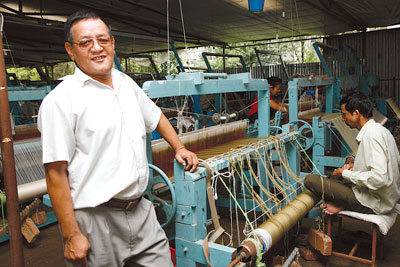 MIN RATNA BAJRACHARYA |
In 2008, when the Chinese were working overtime to finish the infrastructure in time for the Beijing Olympics, in Bhaisepati on Kathmandu's outskirts Lhakpa Geljen Sherpa's factory was also working overtime. Beijing's Grand Hyatt Hotel had outsourced its designer wall panels to Sherpa Everest Art Paper and that was what his workers were trying to finish.
Sherpa's love for traditional Nepali lokta paper began when he was still a boy in Solu Khumbu and his uncle used to lovingly produce the paper, drying the pulp in the sunshine. He had to come to Kathmandu often to make deliveries to customers, and the entrepreneur in him immediately saw an opportunity. After 15 years making paper, Sherpa thought it was time to expand.
"Other people were using our paper and doing good business," says Sherpa. "I thought why not begin our own factory and add value to our products".
Sherpa launched his small factory in Kathmandu 15 years ago with 12 workers. Now, Everest Art Paper employees more than 100 people at its factories in Kathmandu, Bhaktapur, Khopasi and Solu Khumbu. Last year, the business grossed over Rs 50 million.
Along with lokta paper Sherpa works with bamboo, hemp, corn husk and metal to create wall panels, curtains, table cloths and other materials of aesthetic value to be used by interior designers all over the world. He sources his raw materials from Jhapa, Rukum, Rolpa, Kathmandu and several other districts. A creative team at the factory then works to create innovative designs.
All products are exported to partners in China, Australia, the Netherlands, the United States, and even Chile. "Our products reach six continents," Sherpa says proudly.
A majority of the crafts people in the factory are women, and Sherpa explains: "We give preference to women, it is about giving them financial independence which helps improve their standing in their homes," says Sherpa. The working hours are flexible so the young women can also attend colleges.
Sherpa recently began a training school at his hometown of Beni in Solu Khumbu because girls there often drop out of school SLC as their parents are unable to support them.
Sherpa has also started an organic farm in Solu Khumbu and says he intends to go back to his village after not being able to work there during the war years.
He says: "Now, I want to give back to my community what my community gave to me."
Paavan Mathema
Nepali Times begins this new fortnightly column 'Making a Change' profiling social entrepreneurs who do well by doing good.
Read also:
Broken umbrella, ASHUTOSH TIWARI
The FNCCI cannot be just a bystander when labour unions padlock private institutions


